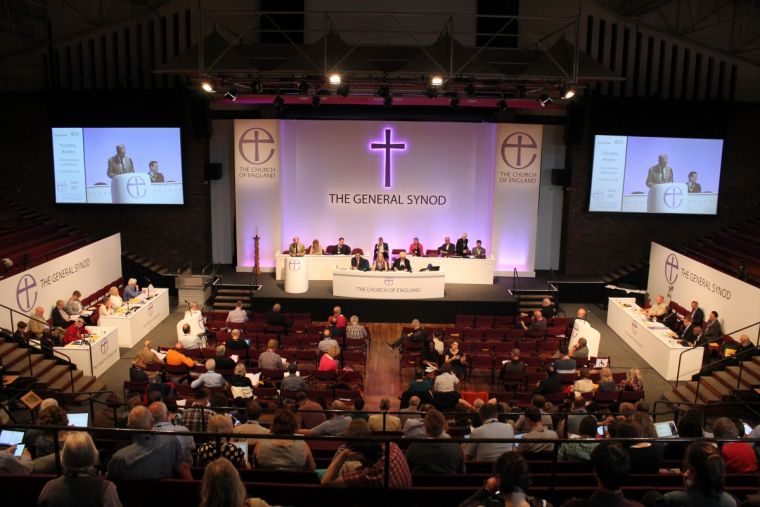
The Church of England’s parliamentary body today agreed to continue moving forward with plans to introduce standalone services of blessing for same-sex couples.
A motion asking that bishops revise current Pastoral Guidance that restricts the use of the Prayers of Love and Faith (PLF) in standalone services was backed by all three houses in the General Synod.
The vote revealed the depth of divisions in the Church of England with 22 bishops voting for and 12 against, with five abstentions. In the House of Clergy, 99 voted for and 88 against, with two abstentions, while in the House of Laity, 95 voted for and 91 against, with two abstentions.
The motion committed the House of Bishops to report back to Synod in February 2025 on further theological work into the implications of PLF for the doctrine of marriage, and clergy in same-sex civil marriages.
Bishop Martyn Snow, lead bishop for the Living in Love and Faith process, said he had heard the concerns of both sides of the debate and wanted them to know that “you have a place in the Church of England, you are loved by God, we want you to be sat at the table”.
He insisted that no one was being forced out of the Church and that introducing the prayers does not amount to a change in doctrine on marriage or sex outside of marriage.
“They are intended as simple prayers which send out a strong message of welcome,” he said.
The Archbishop of York, Stephen Cottrell, said that the last 18 months since Synod first approved the process towards PLF had “felt like 18 months of trench warfare on this issue”, as he asked Synod members to “put down our rifles”. He denied that PLF amounted to a change in doctrine and said that no one would be “asked to do what their conscience cannot allow”.
In the days leading up to the debate, the Alliance network of traditionalist Anglicans in the Church of England wrote to the Archbishops of Canterbury and York warning that if standalone PLF services are introduced, they will “have no choice but rapidly to establish what would in effect be a new de facto ‘parallel Province’ within the Church of England and to seek pastoral oversight from bishops who remain faithful to orthodox teaching on marriage and sexuality”.
In a written response issued prior to Synod, the Bishop of Oxford, Steven Croft, called the letter “threatening” and “catastrophising”.
Addressing Alliance members during the Synod debate, Bishop Snow said, “I know that you want to remain in the Church of England and I am grateful for your commitment to continue in conversation with us.”
The Archbishop of Canterbury, Justin Welby, added that he “cannot imagine the Church of England without the Alliance network members and friends”.
Helen Lamb, a lay Synod member who signed the Alliance letter, was sceptical about the promises.
“Thank you for words of wanting to listen, wanting to engage … but I’m afraid I’ll believe it when I see it,” she said.
“We want to stay on the bus; please don’t run us over.”
Rev Vaughan Roberts warned that the Church of England risked going the same way as the Episcopal Church in the US, which split over the issue of same-sex marriage and blessings.
He warned that the proposals did not offer “a trajectory that makes us believe there’s a place for us”, and warned that “the consequences could be massive”.
Evangelical Anglican theologian and blogger, Rev Ian Paul, echoed these fears and predicted that trust “will finally be broken” and the “Church will split”.
He went on to warn that the Church “will continue in serious decline”.
“In 14 years we have halved in size,” he said. “In one diocese, the number of children attending has dropped by 50 per cent in four years and there are no real signs that this is slowing yet, let alone reversing.
“After the Scottish Episcopal Church changed its doctrine of marriage, it declined by 40 per cent in six years. The Church of Scotland will be extinct by around 2038, in just 14 years from now.
“No Western denomination has changed its doctrine of marriage without then accelerating in decline. We will be no different. This is not catastrophising. This is not a power play. This is honesty. My friends, this is reality.”
He said that if people did want to vote for the motion, they should do so “with your eyes wide open, knowing it will destroy trust, knowing it will divide the Church, knowing it will lead to greater decline”.
“Personally I don’t feel that any of these things are a demonstration of the love of God,” he said.
“Vote for this only if you think distrust, disunity, decline are the price worth paying.”